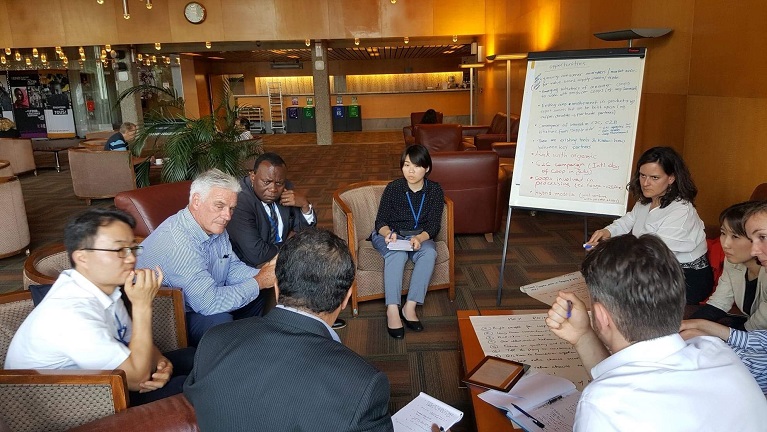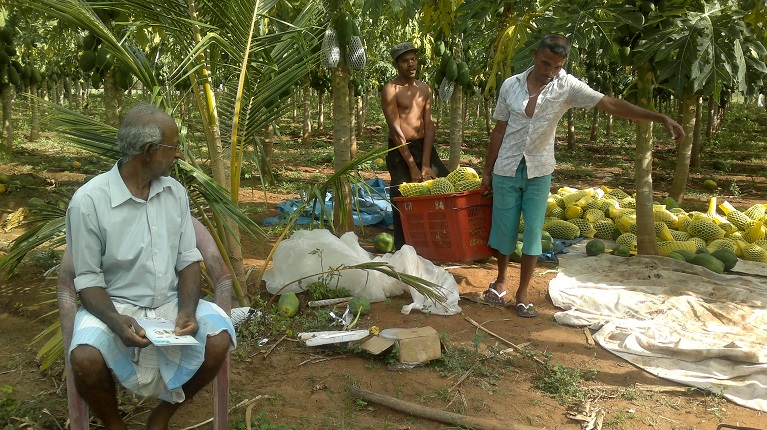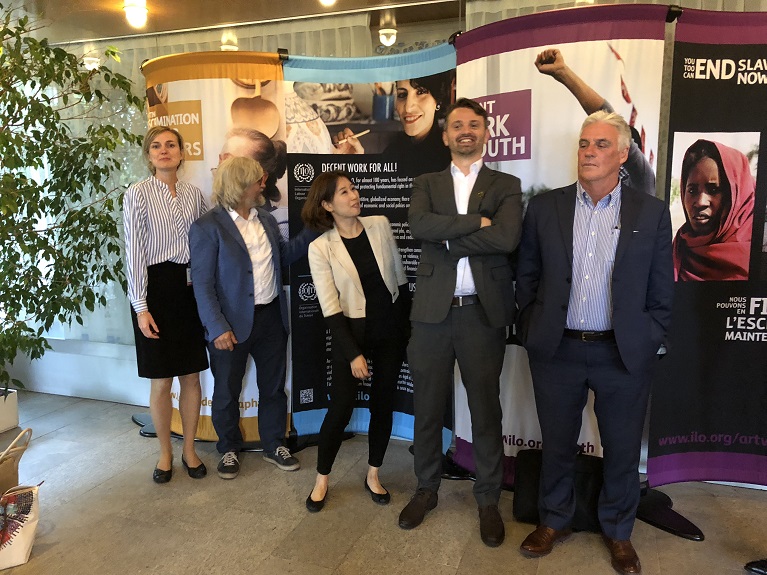ILO COOP 100 Interview
Interview with Joseph Connolly, former ILO official
Established in March 1920, the ILO’s Cooperatives Unit marks its Centenary in 2020. On this occasion, the ILO COOP 100 Interview series features past and present ILO colleagues and key partners who were closely engaged in the ILO's work on cooperatives and the wider social and solidarity economy (SSE). The interviews reflect on their experience and contributions in the past and shares their thoughts on the future of cooperatives and the SSE in a changing world of work.
You have worked in the field in development cooperation projects across countries including in crisis and post-conflict contexts? How did you first get started?
Up until 2000 I worked in relatively peaceful, Zambia, Tanzania, Uganda although they were experiencing their own forms of crisis. At that time, they were going through a “post post” colonial transition with the original political independence era African leaders now been challenged. They were also transitioning from centralized government-controlled economies to those of more free-market driven economies. The transition was driven by structural adjustment programmes. Shortages of basic goods, increasing unemployment, collapse of many social services and a general decrease in the standard of living of ordinary people was evident.In Zambia two attempted coups, food riots sporadic, crime waves etc. were just some of the challenges in living and working there especially in the more remote places of Northern Zambia. One must note that as expatriates we were insulated and much better off than the nationals. However, the experiences developed an empathy and an understanding of how ordinary people can be adversely affected by policies and actions over which they have no control. It was a good grounding for later work in post conflict countries. I had also previously worked in high risk, environments in a previous life. My work in post conflict only truly commenced with ILO in Somalia in 2000.

What do you think is the role cooperatives have to play in times of crises and in crises settings?
I think it is important to appreciate that although the terms conflict and crisis settings are often used together and share many common features and challenges, they are very different environments in which to operate.Having said and before going any further I think one should attempt to appreciate the issue of disempowerment, the feeling of individual helplessness, the sense of despair, and the loss of dignity of individuals in these situations.
A feature of conflicts and crisis is that the individual, families, communities tend to lose control over their lives. In some cases, the state institutions, the laws, etc. that they may have relied upon disappear and there is little that individuals can do to replace that which has been lost.
In other circumstances the state institution may often be one of the parties to the conflict and a major factor in disempowering their own or other countries citizens.
In conflicts people cannot protect themselves or their families, they cannot decide where to live, they are killed, assaulted, raped, lose assets, livelihoods, and get displaced. They in fact become totally disempowered.
Often the way in which the post conflict, post crisis humanitarian or recovery response is organized and implemented tend to further exacerbate or extend the feelings of disempowerment and helplessness and further erodes the sense of personal dignity.
It is felt that the potential of cooperatives to directly address this issue of disempowerment, to rebuild the sense of personal dignity, to regain a sense of control over one’s life to build confidence and hope is really the most important and valuable potential contribution of cooperatives.
Of course and it goes without saying that cooperatives can in a more practical level play a pivotal role in restoring livelihoods, influencing recovery policies, government policies, acting as interlocutors with government, humanitarian and development agencies etc but it’s most valuable impact is often the less obvious and the less tangible as described above, empowering and restoring personal dignity.
In my opinion there can be limitless potential for cooperatives to play a catalytic, implementing, organizational often transformational roles in these environments. However, there are many factors that will influence the nature and extent of those role. It would be too much to comprehensively go through each factor here but from a practical technical cooperation/developmental agency perspective one important factor is the extent to which individuals on the ground, leaders in the field, have an understanding, an empathy and an appreciation of the value system behind the concept of cooperatives the wider social and solidarity economy.
It should also be mentioned that cooperatives can play a very important role in post conflict settings by acting as conduits for communications or as neutral fora for dialogue between communities that may have been in conflict with each other.

Could you share with us some of the highlights of your work with the ILO on how cooperatives played a key role in rebuilding local economies after crises, for instance in Sri Lanka?
The original approach in Northern Sri Lanka (2011-2017) was very much based on the concept of re-empowerment of totally disempowered communities, agricultural and fisheries, who had been totally disempowered by thirty years of war and thirty years of humanitarian responses.They had become passive recipients and dependents of aid. The post conflict recovery responses had exacerbated this sense of disempowerment. The situation was also complicated by an omnipresent state security system that tended to smother any efforts by local community or individuals to organize and/or assume control of their own lives.
The Local Economic Empowerment and Development (LEED) project approach was to help them reorganize, motivate them through their direct implementation of livelihood recovery efforts. Livelihood recovery was a means by which the less tangible by more important concept of social empowerment was addressed.
In five years, communities working in both sectors went from being moribund and aid dependent, suspicious of local authorities, fearful of state security apparatus, to a situation where they could engage with, negotiate, and influence government policy. As an example, the fishery cooperatives brought a legal case in the High Court to challenge the government with respect to the enforcement of the fishery protection legislation. This would not even been considered by the cooperatives in 2011.
In Somalia, the history and experience of cooperatives was very different than Sri Lanka. There, they had experienced the post-colonial government-controlled cooperatives and as such cooperatives did not have a good reputation. What tended to happen was that clan-based communities would organize themselves and act in many ways as cooperatives. However, there were real risks regarding elite capture, vested interests, and direct involvement of private sector business in the management of cooperatives. So, in Somalia each case was judged on its own merits.
By the way, my first experience (about 55 years ago) of cooperatives was in relation to credit unions as my late father was treasurer of the local credit unions and this element of social responsibility was imbued from an early age.
What do you think is the value added of the ILO in crises settings and in promoting cooperative development?
At one level and as an organization that has a very clear mandate to promote social justice through the world of work and has some technical capacity but probably more political capacity it can add value by ensuring that people and the concept of social justice, ( labour is not just factors of production) is central to the post conflict/disaster policies , plans and practices.As a UN agency it can engage at the highest level to achieve this and as a technical “development agency” can in theory demonstrate how these concepts can be realized in a practical way.
The fact that it is a value based organization, with the concept of social dialogue as central to its ethos should inform and shape how it engages and operates in all of its work in these settings. The tripartite nature of the organization can also prove a unique perspective and access to various forums, influencers, policy makers and a very broad canvas of organization that is seldom enjoyed by others. This is an important added value.
For this to happen in post/crisis conflict settings requires that ILO people are technically competent and have the empathy and understanding of the history raison d’etre of the organization and view projects and activities as a means to an end rather than an end in themselves.

The world is experiencing unprecedented challenges with the unfolding COVID-19 crisis. What do you think is needed to tap into the potential of cooperatives and the wider social and solidarity economy in addressing these challenges?
We are indeed in unchartered waters when it comes to COVID 19. There have been many heartwarming spontaneous human reactions to the crisis with individuals coming together for example to assist the elderly, etc. This I suppose is practical social solidarity and demonstrates the underlying common humanity and decency of the social animal the humanoid. However, I am under no illusions that this solidarity will continue, and that society will not go back to the rat race when this challenge is over.What I do think COVID-19 has raised is the questioning by individuals and even governments of this entire concept and implications of globalization. How can governments and through them their citizens regain some influence, re-empower, and regain sovereignty over their own national/local economies and means of production whilst living in this global economy. This is where I think cooperatives have a role in leading the dialogue with respect to re-localizing and rethinking the entire globalization model, focusing on local resources, job creation yet maintaining a global perspective. This also has implication as regards issues such as climate change.
The task is vast and as this pandemic has demonstrated volatile and prone to rapid change. So cooperatives may also have to change, innovate , adapt and attempt to charter new courses in the 21st century to pursue the same goals of “fairer” and people-centred work environment, marketing, trading, economic systems and societies that they did when they were founded several hundred years ago.